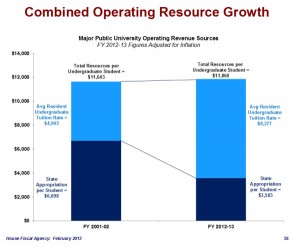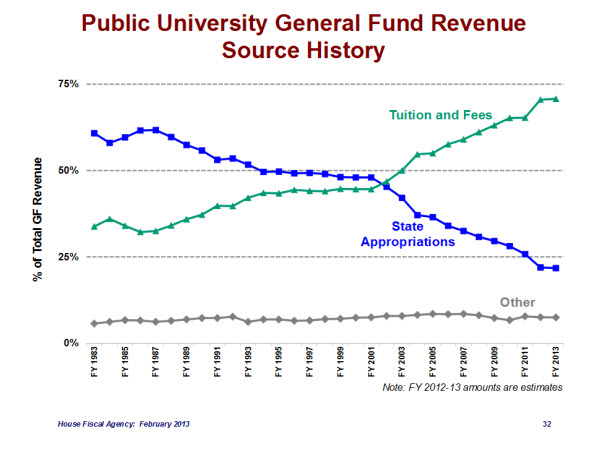Report shows Michigan high for higher ed cuts as legislative panel targets U-M, Wayne St. funds
Michigan’s premier public universities have no problem attracting students, but they’re having a harder time appealing to legislators.
And while decreases in state funding are common across the country today, the percentage of cuts in Michigan is higher than in most states.
Wayne State University could lose 15 percent of its state funding (about $27 million) under a budget approved by a House of Representatives subcommittee Tuesday; the University of Michigan could lose $41 million for the same reason – Republican legislators don’t like the way the schools are dealing with union contracts leading up to implementation of the state’s new Right to Work law. (Overall spending on higher education would increase 2 percent, per Gov. Rick Snyder’s budget request, under the subcommittee’s plan.)
While the reasons for cuts are different, most public universities across the country are getting less funding from the public. A report released Tuesday by the Center on Budget and Policy Priorities ranks states by how much they’ve cut in higher education funding.
Between 2008 and 2012, Michigan cut about a third of its higher education funding, when adjusted for inflation, the 13th highest rate in the nation. Only two states, Wyoming and North Dakota, increased higher education funding during that period. The national average was a 28 percent cut.
Universities have increased tuition to make up for the loss in state funding.
For example, in 2001-02, average state funding per college student attending Michigan’s 15 public universities was $6,698, with average tuition of $4,945 (in today’s dollars), according to the House Fiscal Agency. By 2012-13, the state appropriation was $3,572 and tuition $8,253.
While all states are cutting university funding, Michigan has been cutting more and cutting for longer. The result is that Michigan families spend more to send their children to their state’s public universities than do families in other states.
A Bridge Magazine analysis in January 2012 found that the average net cost of 12 of Michigan’s 15 public universities was higher than the cost at peer institutions across the country.
See how the cost of Michigan’s 15 public universities stacked up, as of January 2012
Senior Writer Ron French joined Bridge in 2011 after having won more than 40 national and state journalism awards since he joined the Detroit News in 1995. French has a long track record of uncovering emerging issues and changing the public policy debate through his work. In 2006, he foretold the coming crisis in the auto industry in a special report detailing how worker health-care costs threatened to bankrupt General Motors.
Michigan Education Watch
Michigan Education Watch is made possible by generous financial support from:
Subscribe to Michigan Education Watch
See what new members are saying about why they donated to Bridge Michigan:
- “In order for this information to be accurate and unbiased it must be underwritten by its readers, not by special interests.” - Larry S.
- “Not many other media sources report on the topics Bridge does.” - Susan B.
- “Your journalism is outstanding and rare these days.” - Mark S.
If you want to ensure the future of nonpartisan, nonprofit Michigan journalism, please become a member today. You, too, will be asked why you donated and maybe we'll feature your quote next time!


 CLICK TO ENLARGE
CLICK TO ENLARGE

